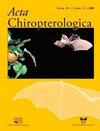Listen But Do Not Touch: Using a Smartphone Acoustic Device to Investigate Bat Activity, with Implications for Community-Based Monitoring
IF 0.7
4区 生物学
Q4 ZOOLOGY
引用次数: 2
Abstract
The monitoring of bats across the world is mostly conducted using invasive mist-netting, whereby vertical nets are placed to capture bats mid-flight. Many studies have demonstrated how this approach causes sampling bias, is labor-intensive and increases the risk of white-nose syndrome fungus, Pseudogymnoascus destructans, transmission among bats. Increasingly, acoustic devices are being employed to collect data on bat activity and richness. Community-based monitoring is an important data collection source for bat monitoring programs in countries such as the UK (National Bat Monitoring Program), whereby walking bat transects are conducted using bat detectors. Since the launch of smartphone devices to record and auto-identify bat echolocation calls, the quality of data collection that community members can collect has increased significantly, however, this approach is seldom used to generate data in scientific studies. In our study, we have showcased how our study design paired with state of the art acoustic monitoring devices, can be applied to community-based monitoring of bats across the world. Through employing smartphone acoustic devices, we have determined how primary and secondary vegetation cover are predictors of bat species occurrence and identified the importance of riverine and deciduous swamp habitats for rare bat species in southwestern Ontario.聆听但不要触摸:使用智能手机声学设备调查蝙蝠活动,对社区监测的影响
对世界各地蝙蝠的监测主要是使用侵入式雾网进行的,即放置垂直的网来捕捉飞行中的蝙蝠。许多研究已经证明,这种方法如何导致抽样偏差,是劳动密集型的,并增加了白鼻综合征真菌,破坏性假裸子霉菌在蝙蝠之间传播的风险。越来越多的声学设备被用于收集蝙蝠活动和丰富程度的数据。基于社区的监测是英国(国家蝙蝠监测计划)等国家蝙蝠监测计划的重要数据收集来源,其中使用蝙蝠探测器对行走的蝙蝠进行取样。自从智能手机设备开始记录和自动识别蝙蝠的回声定位呼叫以来,社区成员可以收集的数据收集质量大大提高,然而,这种方法很少用于科学研究中的数据生成。在我们的研究中,我们展示了我们的研究设计如何与最先进的声学监测设备相结合,可以应用于世界各地以社区为基础的蝙蝠监测。通过使用智能手机声学设备,我们确定了安大略省西南部主要和次要植被覆盖是蝙蝠物种发生的预测因子,并确定了河流和落叶沼泽生境对珍稀蝙蝠物种的重要性。
本文章由计算机程序翻译,如有差异,请以英文原文为准。
求助全文
约1分钟内获得全文
求助全文
来源期刊

Acta Chiropterologica
生物-动物学
CiteScore
2.50
自引率
20.00%
发文量
42
审稿时长
>12 weeks
期刊介绍:
Acta Chiropterologica, published by the Museum and Institute of Zoology at the Polish Academy of Sciences, is devoted solely to the study and discussion of bats.
 求助内容:
求助内容: 应助结果提醒方式:
应助结果提醒方式:


